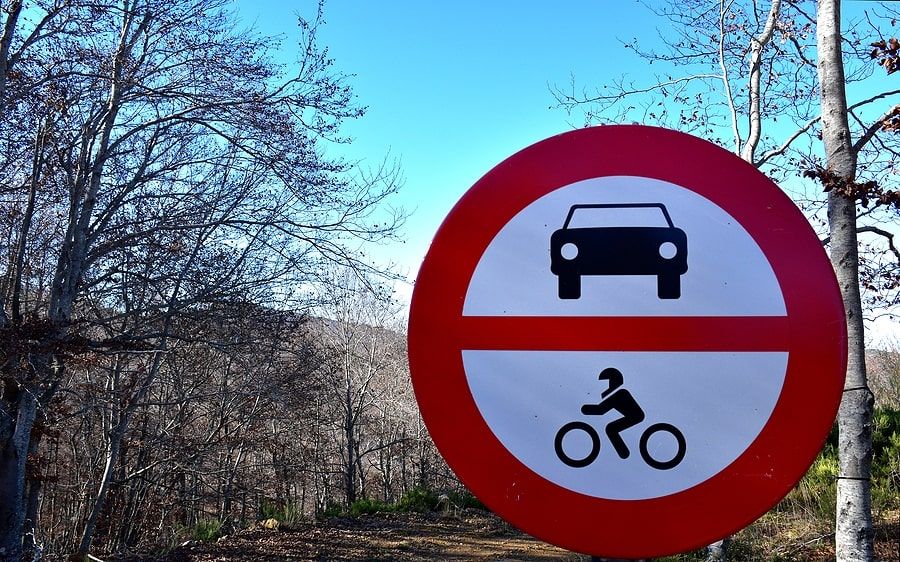The 7 Most Important Tennessee Motorcycle Laws
Taking a motorcycle ride is an exhilarating and liberating experience. There's nothing quite like hearing the wind whip around you as you cruise down the road, at one with your bike. However, you can't talk about the wonders of bikes without also talking about the dangers that come with them. Motorcyclists are 28 times more likely to die in a motor vehicle crash and are five times more likely to be injured than those in a car.

Startling statistics like those outlined above underscore the importance of prioritizing safety when riding a motorcycle.-�-� Your protection and the safety of other drivers should be your top priority. Whether you're cruising through Knoxville, Nashville, or exploring the national parks around the Smoky Mountains, understanding and following all Tennessee motorcycle laws is crucial for a secure and protected ride.
Tennessee Motorcycle Enthusiasts FAQs
Motorcycle laws and regulations differ from state to state. In this blog, we'll focus on those relevant to Tennessee. The seven most important Tennessee motorcycle laws cover insurance, licenses, helmets, passengers, special equipment, and lane-splitting.
Do You Need Motorcycle Insurance in Tennessee?
Yes, you must have insurance coverage to operate a motorcycle legally in the state of Tennessee. You must provide proof of insurance when registering a bike. Riding without insurance could lead to fines or a license suspension if the police stop you and you cannot provide proof of insurance. If you're involved in an accident while riding and lack insurance, you will be responsible for paying all vehicle repair and medical expenses. Motorcycle owners are also required to carry a minimum level of insurance, which typically includes liability coverage, to maintain their license and operate a motorcycle legally.
At What Age Can You Get a Motorcycle License in Tennessee?
Under Tennessee motorcycle laws, you must be 16 years of age or older to operate a motorcycle. To obtain a Class M motorcycle license or motorcycle instruction permit, you must pass a motorcycle knowledge and sign test, on-cycle ability skills test, and a vision screening. Individuals aged 15 years or older must obtain a special permit to operate a motorcycle, subject to certain restrictions, after fulfilling the licensing requirements. Always ride with a current motorcycle license.
What Happens if I am Found to be Driving Without a Motorcycle License in Tennessee?
The penalties for driving without a motorcycle license in Tennessee are severe. You could face penalty points, a fine, and your motorcycle might be impounded and towed. This underscores the importance of adhering to the laws and regulations, making you fully aware of your responsibility as a rider.
Is there a motorcycle helmet law in Tennessee?
The Tennessee motorcycle helmet law requires all motorcyclists and passengers to wear a safety helmet. Reports indicate that crashes are on the rise nationwide and can be devastating. According to NewsChannel5, Tennessee motorcycle accident fatalities reached an all-time high of 200 deaths in 2023. Wearing a helmet isn't just the law; it saves lives. The Centers for Disease Control and Prevention says helmets decrease the risk of death by 37 percent and head injuries by 69 percent.
Look for a helmet approved and labeled by the Department of Transportation to show it complies with standards from the Southern Impact Research Center, the Consumer Product Safety Commission, or the Snell Foundation, a non-profit dedicated to developing helmet safety standards. Your helmet should include a reflective feature to help other drivers see you at night. If you are caught riding without a helmet, you may be issued a ticket and fined $50 or more, with a potential penalty of up to 30 days in jail.
Helmets should be replaced every five years. Check your helmet regularly for cracks or other damage that could compromise your safety. When choosing a helmet, ensure it fits your head correctly.
What Are the Rules When Riding a Motorcycle with a Passenger?
If you're riding with a passenger, the motorcycle must have passenger seats and footrests. Remember that other drivers on the road may not always see you, so take extra precautions and ensure that your fellow rider is also wearing an approved helmet and a protective jacket with reflective tape or other fluorescent material to stay visible at night.
Does My Motorcycle Require Special Equipment?
Tennessee motorcycle laws require bikes to have both a left- and right-side mirror, as well as a muffler. When riding a motorcycle in Tennessee, you must also use your headlight during daylight hours. Additionally, regularly check to ensure your headlights, taillights, and brake lights are functioning correctly. Make it a habit to perform a safety inspection before each ride. Properly functioning turn signals and brakes, both front and rear, are also essential for your safety and the safety of other drivers on the road.
Is Lane Splitting Legal in Tennessee?
When caught in a traffic jam, instead of stopping behind a car for a long time, it might be tempting to ride between lanes. However, lane splitting in Tennessee is illegal. According to code 55-8-182, "the operator of a motorcycle shall not overtake and pass in the same lane occupied by the vehicle being overtaken."
Riding a motorcycle in Tennessee can be an exciting way to reduce stress and explore new places. Taking the time to learn about new motorcycle laws in Tennessee, as well as safety and licensing rules, can make the experience even better. Sometimes, knowing the laws of the road isn't enough to protect you.
If you've been involved in a motorcycle accident, call Steelhorse Law.
